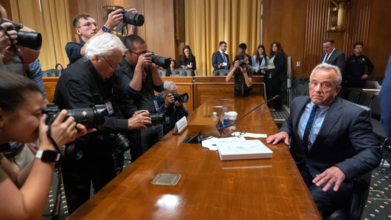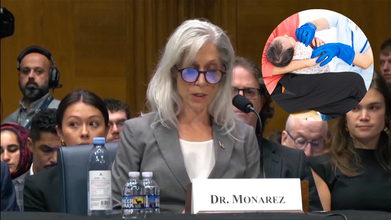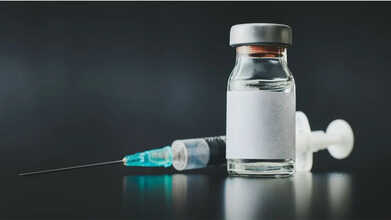- Health Conditions A-Z
- Health & Wellness
- Nutrition
- Fitness
- Health News
- Ayurveda
- Videos
- Medicine A-Z
- Parenting
- Web Stories
Explained: After UK, Scotland Too Bans Puberty Blockers For Under 18, Know What It Means

Credits: Canva
Recently on December 11, the British government indefinitely banned puberty blockers for children with gender dysphoria. This step was taken after independent experts found that there was an unacceptable safety risk involved when prescribing this medication.
Before getting into the "why" of the ban, let's understand what gender dysphoria is and what puberty blockers do.
Gender Dysphoria
As per the National Health Service (NHS), UK, gender dysphoria is a term that describes a sense of unease that a person may have because of a mismatch between their biological sex and their gender identity. The NHS writes, "Most people identify as "male" or "female". These are sometimes called "binary" identities. However, some people feel their gender identity is different from their biological sex. For example, some people may have male genitals and facial hair but do not identify as a male or feel masculine."
NHS notes that children show their interest through the choice of toys and clothes that are often associated "societally" with the opposite gender.
Puberty Blocker
They are a type of medication that delays the changes of puberty in gender-diverse youth. They are called gonadotrophin-releasing hormone (GnRH).
How does it work?
Sex hormones get affected once you consume this medicine. Sex hormones determine the sexual organs present at birth, which are also known as the primary sex characteristics. They include the penis, scrotum and testicles, and the uterus, ovaries and vagina. In contrast, the secondary sex characters are the organs or physical changes that occur in our body after we hit puberty. For instance, facial hair, development of breasts, etc.
So what do puberty blockers do?
It delays puberty, which can combat the symptoms, as noted by NHS, which can occur if someone experiences gender dysphoria. The symptoms include:
- low self-esteem
- becoming withdrawn or socially isolated
- depression or anxiety
- taking unnecessary risks
- neglecting themselves
The puberty blocker by delaying the development of secondary sex character helps with the:
- improving mental well-being
- ease depression and anxiety
- improve social interactions with others
- lower the need for future surgeries
- ease thoughts or actions of self-harm
So, why is it banned?
The UK stated that this decision will be revisited in 2027, till then the ban remains effective. However, it goes against standards held by medical groups including the European and World Professional Associations for Transgender Health and American Medical Association and the American Academy of Pediatrics.
The ban was put in place by the Conservative government and has been extended by the Labour government too. The announcement comes after a judge upheld an emergency ban in a ruling that said this treatment could be potentially harmful. However, NHS also stopped prescribing puberty blockers at gender identity clinics stating that there was not enough evidence found for either benefits or harms.
However, in July, Justice Beverley Lang said that the review commissioned by the NHS found "very substantial risks and very narrow benefits” to the treatment. The confusion exists because the British Medical Association further noted that the NHS review was controversial and included patients, academics, scientists and legal experts among its critics. However, the group that challenged the court - TransActual criticized the decision and said that evidence of danger from 40 years of puberty blocker cannot be tracked.
Banning medicines with no evidence of serious harm, only for trans people … is discrimination plain and simple,” said Keyne Walker, the group’s strategy director. “Evidence of the harm of the temporary ban continues to emerge, and will grow now that it has been made permanent.”
Why the ban in Scotland?
The Scottish government also confirmed that as the medicine policy is reserved to Westminster, the ban would also apply across England, Scotland and Wales.
However, the ban is not on those who are already consuming the medicine for gender dysphoria, but on the "new children and young people aged under 18 years from beginning to take puberty blockers for the purposes of gender incongruence and/or gender dysphoria. under the care of private or non-UK prescribers".
Not Just COVID-19, Or Hepatitis B, Kennedy's New Vaccine Committee Plans To Change Chickenpox, Measles, Mumps And Rubella Shots

RF Kennedy Jr, Health Secretary, Source: AP
The future of childhood vaccinations in the U.S. is suddenly in question. Health Secretary Robert F. Kennedy Jr.’s newly restructured vaccine advisory committee is set to vote this week in Atlanta on whether to alter long-standing recommendations for several critical vaccines, including shots against chickenpox, measles, mumps, rubella, hepatitis B, and COVID-19.
The committee, known as the Advisory Committee on Immunization Practices (ACIP), plays a powerful role: its recommendations guide pediatricians nationwide and determine which shots are covered by the government-funded Vaccines for Children (VFC) program, a safety net for low-income families.
While some experts say the agenda looks like a routine review, others worry it could open the door to unnecessary confusion, weaken trust, and reduce access to vaccines that have long protected children from serious disease.
Also Read: Unique Symptoms Of Covid In 2025 And How Long Infection Now Last
Chickenpox and the MMRV Vaccine Debate
Before the chickenpox vaccine was licensed in 1995, nearly every American child contracted the disease. While often dismissed as a rite of passage with itchy rashes and mild fevers, chickenpox could also lead to severe complications like pneumonia, skin infections, brain swelling, and in rare cases, death. The virus, varicella, also lingers in the body and can resurface decades later as shingles, a painful nerve condition.
The introduction of the vaccine dramatically reduced cases and hospitalizations. In 2005, regulators approved a combination shot called MMRV, which bundled measles, mumps, rubella, and varicella vaccines into a single injection. Initially, health officials recommended the combo as the preferred option for the first dose in toddlers.
However, studies soon revealed a catch: children who received the MMRV shot were more likely to develop fevers, rashes, and in rare instances, febrile seizures compared with those who got separate MMR and varicella injections.
In response, the ACIP in 2009 updated its guidance, recommending separate shots for the first dose (typically given between ages 12–15 months) but allowing the combo shot for the second dose in preschool years.
Today, most pediatricians follow that approach. Still, the evidence hasn’t changed in over a decade. That raises eyebrows about why the Kennedy-led committee is reopening the debate now.
Public health experts caution that limiting the combined shot could make vaccination less convenient for families and potentially reduce uptake. Pediatric advisors warn that even small barriers, like two shots instead of one, can mean some kids fall behind.
Why Measles, Mumps, and Rubella Still Matter
While much of the attention is on chickenpox, the measles, mumps, and rubella (MMR) vaccine remains equally critical. Each of these viruses was once a common threat in childhood:
- Measles can lead to pneumonia, brain swelling, and death.
- Mumps can cause meningitis and, in boys, permanent infertility.
- Rubella is especially dangerous for pregnant women, sometimes causing miscarriage or severe birth defects.
Before widespread vaccination began in the 1970s, hundreds of thousands of children in the U.S. contracted these diseases every year. Outbreaks have returned in recent years when vaccination rates dip, underscoring the importance of reliable and consistent recommendations.
Revisiting guidance without new evidence, experts say, risks fueling skepticism among parents already facing a flood of misinformation online.
The COVID-19 Vaccine Question
The COVID-19 shots are also on the table. Typically, ACIP renews recommendations annually for vaccines against respiratory viruses such as flu. But this June, Kennedy’s panel endorsed flu vaccines while staying silent on COVID-19.
Also Read: US Health Officials To Examine Covid Vaccine Effects In Pregnant Women And Kids
That silence matters. Earlier, Kennedy had already removed COVID-19 shots from CDC recommendations for healthy children and pregnant women, sparking lawsuits from pediatric groups who said the move endangered kids’ health.
The FDA recently narrowed the authorization of updated COVID-19 vaccines, limiting use for certain younger groups. If ACIP mirrors that without clarification, millions of children could lose federally funded access through the Vaccines for Children program. Experts warn this could leave families confused, especially since COVID-19 formulations update yearly, much like flu shots.
Revisiting Hepatitis B Vaccinations
Hepatitis B presents a different set of challenges. The virus can cause chronic liver infection, cirrhosis, and cancer. While adults often acquire it through sexual contact or sharing needles, newborns face the highest lifelong risk if exposed at birth.
Since 2005, U.S. guidance has recommended that infants receive their first hepatitis B shot within 24 hours of birth. This approach significantly reduced cases of mother-to-child transmission, which often slipped through maternal screening programs. Studies show the newborn shot is safe and highly effective, preventing 85–95% of chronic infections.
Yet Kennedy’s committee has floated the idea of revisiting this recommendation, though experts note there is no new evidence suggesting safety concerns. Critics argue that questioning the birth dose now could reverse decades of progress.
Why the Stakes Are So High
Beyond the science, the politics surrounding these deliberations are unusual. Kennedy, once one of the nation’s most vocal vaccine skeptics, dismissed the 17-member ACIP earlier this year and replaced it with a panel that includes several anti-vaccine voices.
Historically, ACIP’s recommendations are based on careful review by subcommittees made up of pediatricians, infectious disease experts, pharmacists, and public health officials. Those subgroups sift through peer-reviewed studies, track outbreaks, and balance risks against benefits. But this time, critics say the process appears less about science and more about ideology.
Even if the committee doesn’t overturn long-standing guidance, simply reopening settled debates may erode confidence. Parents who hear that vaccines are “under review” might delay or decline shots, leaving children vulnerable.
Perhaps most worrisome: a restrictive vote could block coverage of these vaccines under the Vaccines for Children program, which supplies nearly half of all childhood shots in the U.S. Without it, low-income families could lose access, widening gaps in protection.
What Lies Ahead?
The stakes of this week’s ACIP votes go far beyond the meeting room in Atlanta. At issue is not just whether a child gets one shot or two, but whether the nation maintains decades of progress against diseases once considered inevitable.
Chickenpox, measles, mumps, rubella, hepatitis B, and COVID-19 vaccines have all proven their worth in protecting children from dangerous, sometimes deadly illnesses. Experts say undermining trust or restricting access now could reopen the door to outbreaks that public health worked so hard to shut.
Hepatitis B Vaccination Timeline For Children Under Review Without Scientific Data, Says Former CDC Director Susan Monarez

Credits: Canva and Reuters
The US childhood vaccination schedule has become the center of a heated debate and much attention is being drawn towards it after a Senate hearing revealed the possible changes to when critical shots like the hepatitis B vaccine are given. Susan Monarez, former director of Centers for Disease Control and Prevention (CDC) at the Senate Committee on Health, Education, Labor and Pensions hearing said that she was fired in August for refusing two demands by Health Secretary Robert F Kennedy Jr, which were: fire career agency officials and sign off vaccine recommendations without seeing any data.
“He said if I was unwilling to do both, I should resign,” she said. “I responded that I could not pre-approve recommendations without reviewing the evidence, and I had no basis to fire scientific experts.”
At stake is not just the timeline of immunization, but also health and safety of millions of children who rely on vaccines to protect them from life-threatening diseases.
“The concern is Robert F Kennedy [Jr.] is going to make America sicker again,” said Sen. Ed Markey, D-Mass. “They’re going to send us towards more disease, more death and more despair in our nation.”
Why Does Vaccine Schedule Matter?
The CDC, through its Advisory Committee on Immunization Practices (ACIP), sets the recommended vaccine schedule for children. While not mandatory, these guidelines strongly influence what health insurers cover and how doctors across the country advise parents.
For decades, the schedule has ensured that children are vaccinated against highly contagious diseases at the ages when they are most vulnerable. Changes to this timeline are not simply administrative, they have direct consequences on whether children remain protected against illnesses that once caused widespread suffering and death.
Debate Around The Hepatitis B Vaccine
One of the most debated issues that has risen is the hepatitis vaccine. It is from 1991 that the CDC recommended that babies must receive the first dose within 24 hours of birth, followed by additional doses at one month and between six to eighteen months.
This timing is not arbitrary. Hepatitis B is a viral infection that attacks the liver and can lead to cirrhosis, cancer, and lifelong health complications. Critically, the risk of developing chronic hepatitis B depends on the age at which a person is infected. Babies infected at birth have up to a 90% chance of developing chronic infection. Adults, by comparison, have only about a 5% chance.
Because many mothers are unaware they carry the virus, the birth dose serves as a crucial safeguard. It blocks transmission at the earliest stage, preventing lifelong illness and premature deaths.
So, What Could Change?
Sen. Bill Cassidy, R-La., the committee’s chair, asked Monarez if Kennedy had told her he was going to change the childhood vaccination schedule. “He said that the childhood vaccine schedule would be changing starting in September, and I needed to be on board with it,” Monarez said.
What is being proposed contradicts the CDC recommendation of hepatitis shot being the first one for a child to receive within 24 hours of being born. Testimony at the Senate hearing suggested that the vaccine schedule could be revised to delay the first dose of the hepatitis B shot until age 4. Former CDC officials raised alarms that this proposal was not based on scientific data but rather political direction.
If implemented, such a shift would mean babies could go unprotected during the period when they are most at risk of contracting hepatitis B from their mothers or close contacts. Experts warned this would undo decades of progress in reducing infant infections, from 20,000 cases annually before 1991 to fewer than 20 per year today.
Risks of Delaying Vaccination
Delaying hepatitis B vaccination could open the door to a resurgence of preventable infections. Even if mothers are screened during pregnancy, screening isn’t perfect, and some may acquire the infection late in pregnancy or go undiagnosed. Without the immediate protection of the birth dose, babies would be vulnerable.
Moreover, shifting vaccines later in childhood carries another risk: missed doses. Studies show that adherence to vaccines is highest in infancy, when routine well-baby visits are frequent. Delaying could mean some children never get fully vaccinated at all.
The consequences are not minor. Untreated hepatitis B leads to chronic infection in most infants, setting them on a path toward liver damage, cirrhosis, and cancer later in life.
Concerns for Childhood Immunization
The hepatitis B vaccine isn’t the only one under review. The same advisory panel is expected to revisit recommendations for measles, chickenpox, and the updated COVID-19 shot.
Also Read: US Health Officials To Examine Covid Vaccine Effects In Pregnant Women And Kids
Critics worry that altering the established childhood schedule without thorough scientific review could destabilize public trust and increase preventable outbreaks.
The controversy comes at a time when confidence in public health agencies is already slipping. According to a recent KFF poll, trust in the CDC dropped from 63% in 2023 to 57% in 2025. Changes seen as politically motivated, rather than evidence-driven, could erode that trust even further.
Why Science-Based Decisions Are Essential
Experts stress that vaccination decisions should be grounded in data, not politics. The success of public health in the U.S., from reducing measles deaths to nearly eliminating mother-to-child hepatitis B transmission—has hinged on science-led policymaking.
Sen. Bill Cassidy, a gastroenterologist, reminded lawmakers that the hepatitis B vaccine transformed infant health in America: “Before 1991, as many as 20,000 babies were infected with hepatitis B each year. Now, fewer than 20 babies annually get the virus from their mother.”
Such achievements highlight the life-saving role of evidence-based vaccination. Undoing or weakening these protections without compelling scientific justification risks reversing decades of progress.
What Comes Next?
The ACIP meeting will be pivotal in determining the future of the childhood vaccine schedule. If changes are recommended, they could reshape how millions of American children are immunized. However, for many experts, the principle remains clear: any adjustments must be backed by rigorous data and public health expertise.
US Health Officials To Examine Covid Vaccine Effects In Pregnant Women And Kids

Credits: Canva
Federal health officials are taking a closer look at the safety of COVID-19 vaccines in pregnant women and children, while also weighing updates to recommendations for older adults.
According to U.S. News, the Food and Drug Administration (FDA) is reviewing reports of possible birth defects following vaccination during pregnancy and is preparing data on deaths in children after receiving COVID shots.
The review will be presented during a September 18-19, 2025, meeting with the Centers for Disease Control and Prevention’s (CDC) vaccine advisory committee, CNN reported. Experts emphasise that the Vaccine Adverse Event Reporting System (VAERS), one of the primary tools being used in the review, is a monitoring system meant to detect potential safety signals. It does not establish that vaccines directly caused the reported health problems.
What Is VAERS?
The Vaccine Adverse Event Reporting System (VAERS) is designed to act as an early-warning tool, flagging potential safety signals that may warrant further study. “VAERS is a system that generates hypotheses,” explained Dr Demetre Daskalakis, who recently stepped down as director of the CDC’s National Center for Immunization and Respiratory Diseases, in an interview with CNN.
So far, large-scale studies have continued to show that COVID-19 vaccines are safe in pregnancy. The CDC has tracked outcomes in more than 23,000 pregnant women through one registry and more than 45,000 in another database, finding no increased risk of miscarriage, major birth defects, or other complications. Similarly, Pfizer reported that rates of birth defects in vaccinated participants during a clinical trial were comparable to those in the general population.
The CDC advisory committee is also expected to discuss whether vaccine guidance for older adults should be revised. While COVID vaccines are currently approved for adults 65 and older, as well as younger adults at high risk of severe illness, the panel may consider recommending them mainly for those 75 and older, or for younger individuals with underlying conditions.
ALSO READ: Is 'Stratus' COVID Variant The Pandemic’s Next Chapter In 2025 With New Symptoms?
New COVID Variant ‘Stratus’ Dominates U.S. Cases
COVID-19 activity remained high across the United States during the first week of September, according to fresh data from the Centers for Disease Control and Prevention (CDC). Despite the confusion around emerging strains, shifting vaccine guidelines, and cuts to vaccine development funding, the agency continues to track cases, hospitalisations, and deaths on a weekly basis.
For the four weeks ending August 30, projections show that a new variant called XFG. nicknamed “Stratus” accounted for 78 percent of infections nationwide. The next most common strains were NB.1.8.1 at 14 percent and LP.8.1 at 3 percent.
ALSO READ: Ozempic Users Found To Age Back By More Than 3 Years, Finds New Trial; Peer Review Pending
What Is the ‘Stratus’ Variant?
XFG is a late-summer Omicron offshoot and a recombinant strain, formed by blending two earlier lineages: F.7 and LP.8.1.2. Scientists say the variant may carry mutations that help it slip past parts of the immune system more effectively, though there is no evidence yet that it spreads faster than previous strains.
The CDC advises people to watch for familiar COVID-19 symptoms, which continue to include:
- Fever or chills
- Cough
- Fatigue
- Sore throat
- Loss of taste or smell
- Congestion
- Muscle aches
- Shortness of breath
- Headache
- Nausea or vomiting
© 2024 Bennett, Coleman & Company Limited

